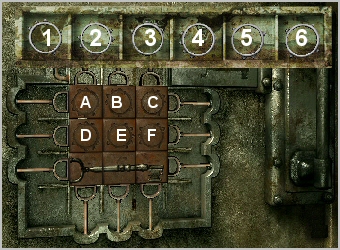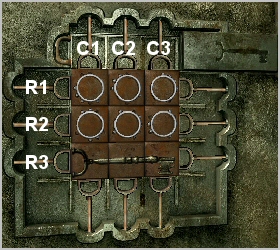RINGS SOLUTION | ||||||||||
| ||||||||||
| Study the spikes on the rings and the grooves on the squares. Initially try to establish whether any of the rings will only fit one specific square. Don't forget that the rings must be rotated to align the spikes with the grooves. All the rings except 6 will fit into more than one square, so start by placing 6 into E (after rotating it once to the right). Now work your way through the rings, noting which squares they fit into. | ||||||||||
| (a) 6 only fits into E - after one rotation right (b) 1 will fit into either A, B or D (c) 2 will fit into either A or D (d) 3 will fit into either A or E, but E already has 6 fitted into it (e) Therefore 3 must go into A - after five rotations left (f) You now know that 2, as per (c) above, cannot go into A because 3 has to go there (g) Therefore 2 must go into D - after three rotations left (h) Using the same logic you now know that 1, as per (b) above, cannot go into A nor D (i) Therefore 1 must go into B - after one rotation left (j) There are now two rings and two squares remaining (k) 4 will now only fit into C - after five rotations right (l) By default, 5 must go into F - after three rotations right | ||||||||||
SUMMARY | ||||||||||
| 1 fits into B - after one rotation left | ||||||||||
| 2 fits into D - after three rotations left | ||||||||||
| 3 fits into A - after five rotations left | ||||||||||
| 4 fits into C - after five rotations right | ||||||||||
| 5 fits into F - after three rotations right | ||||||||||
| 6 fits into E - after one rotation right | ||||||||||
SLIDER PUZZLE | ||||||||||
| Inserting all 6 rings correctly is only the first part. To complete the puzzle the 3 bottom squares (each depicting part of a large gold key) must be manipulated to the top row and then into the actual lock. | ||||||||||
| ||||||||||
| Note that the squares cannot be reset to their original positions, so you should save a game at this point. | ||||||||||
| This is another slider puzzle, albeit in a slightly different form. Three squares (either a particular row or column) are always moved together. Rows can be moved left or right and columns up or down unless either is blocked by another row or column. Your strategy should be to first move all the key squares up to the middle row, then up to the top row and finally up and to the right into the lock. | ||||||||||
| ||||||||||

